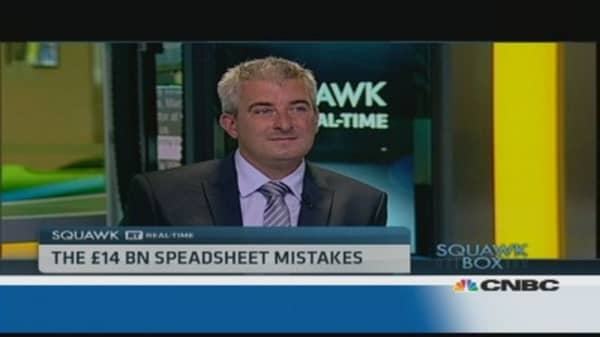Spreadsheet errors are costing businesses billions of pounds, according to a financial modeling company, which is calling for the introduction of industry-wide standards to reduce the risk of mistakes.
F1F9 estimated that 88 percent of all spreadsheets have errors in them, while 50 percent of spreadsheets used by large companies have material defects. The company said the mistakes are not just costly in terms of time and money - but also lead to damaged reputations, lost jobs and disrupted careers.
(Read more: The top 5 small business mistakes)
"What we need to do is take a look at how we use these spreadsheets. These spreadsheets underpin every critical business decision, and actually there are some real fundamental problems with the way spreadsheets are used," Kenny Whitelaw-Jones, managing director at F1F9, told CNBC on Tuesday.
A lack of industry-wide standards in financial modeling was the main cause of these mistakes, Whitelaw-Jones said. "If we can agree standards around how these models are put together, then it significantly reduces the risk of error," he said.
Some businesses were starting to harmonize their approaches to building these models, with the aim of reducing these types of errors, Whitelaw-Jones added. "But they are not eliminated – humans are still going to make errors. If the spreadsheet is ridiculously complex and impossible to read then nobody has a chance of actually reading it – and determining if there are any errors of it in the first place. That just becomes impossible."
In an eBook entitled "The Dirty Dozen", F1F9 outlines 12 of the most high-profile financial modeling errors, with Carmen Reinhart and Kenneth Rogoff's analysis into government debt-to-GDP ratios at number one.
(Read more: JPMorgan review finds errors in debt-collection lawsuits: WSJ)
The ranking also included the omission of a minus sign which cost Fidelity Magellan Fund around £1.6 billion ($2.45 billion) in 1995, and the British government's botched efforts to assess bids for the West Coast Rail Line in 2012, which is estimated to have cost around £50 million ($76.6 million).
"We think that's really just the tip of a much bigger iceberg – spreadsheets are used ubiquitously, and there are some real significant problems with the way they are used and that leads to real risk of error, and we're seeing that time and again," Whitelaw-Jones said.
His comments come as the administrators of an Irish insurance company accused PricewaterhouseCoopers (PwC) of "negligent auditing."
Michael McAteer and Paul McCann, from accountancy firm Grant Thornton, are suing the accounting firm for 1 billion euros ($1.3 billion), but PwC said the proceedings were "unjustified and devoid of merit."
—By CNBC's Katrina Bishop. Follow her on Twitter @KatrinaBishop




